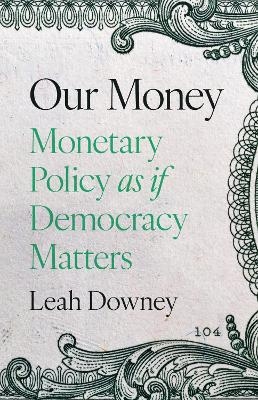
Our Money
Monetary Policy as if Democracy Matters
Seiten
2024
Princeton University Press (Verlag)
978-0-691-24443-3 (ISBN)
Princeton University Press (Verlag)
978-0-691-24443-3 (ISBN)
- Noch nicht erschienen (ca. Dezember 2024)
- Versandkostenfrei innerhalb Deutschlands
- Auch auf Rechnung
- Verfügbarkeit in der Filiale vor Ort prüfen
- Artikel merken
How the creation of money and monetary policy can be more democratic
The power to create money is foundational to the state. In the United States, that power has been largely delegated to private banks governed by an independent central bank. Putting monetary policy in the hands of a set of insulated, nonelected experts has fueled the popular rejection of expertise as well as a widespread dissatisfaction with democratically elected officials. In Our Money, Leah Downey makes a principled case against central bank independence (CBI) by both challenging the economic theory behind it and developing a democratic rationale for sustaining the power of the legislature to determine who can create money and on what terms. How states govern money creation has an impact on the capacity of the people and their elected officials to steer policy over time. In a healthy democracy, Downey argues, the balance of power over money creation matters.
Downey applies and develops democratic theory through an exploration of monetary policy. In so doing, she develops a novel theory of independent agencies in the context of democratic government, arguing that states can employ expertise without being ruled by experts. Downey argues that it is through iterative governance, the legislature knowing and regularly showing its power over policy, that the people can retain their democratic power to guide policy in the modern state. As for contemporary macroeconomic arguments in defense of central bank independence, Downey suggests that the purported economic benefits do not outweigh the democratic costs.
The power to create money is foundational to the state. In the United States, that power has been largely delegated to private banks governed by an independent central bank. Putting monetary policy in the hands of a set of insulated, nonelected experts has fueled the popular rejection of expertise as well as a widespread dissatisfaction with democratically elected officials. In Our Money, Leah Downey makes a principled case against central bank independence (CBI) by both challenging the economic theory behind it and developing a democratic rationale for sustaining the power of the legislature to determine who can create money and on what terms. How states govern money creation has an impact on the capacity of the people and their elected officials to steer policy over time. In a healthy democracy, Downey argues, the balance of power over money creation matters.
Downey applies and develops democratic theory through an exploration of monetary policy. In so doing, she develops a novel theory of independent agencies in the context of democratic government, arguing that states can employ expertise without being ruled by experts. Downey argues that it is through iterative governance, the legislature knowing and regularly showing its power over policy, that the people can retain their democratic power to guide policy in the modern state. As for contemporary macroeconomic arguments in defense of central bank independence, Downey suggests that the purported economic benefits do not outweigh the democratic costs.
Leah Downey is junior research fellow at St. John’s College, Cambridge, and a coeditor of A Political Economy of Justice.
| Erscheint lt. Verlag | 10.12.2024 |
|---|---|
| Zusatzinfo | 5 b/w illus. |
| Verlagsort | New Jersey |
| Sprache | englisch |
| Maße | 156 x 235 mm |
| Themenwelt | Geschichte ► Teilgebiete der Geschichte ► Wirtschaftsgeschichte |
| Sozialwissenschaften ► Politik / Verwaltung ► Politische Systeme | |
| Sozialwissenschaften ► Politik / Verwaltung ► Politische Theorie | |
| Wirtschaft ► Volkswirtschaftslehre ► Finanzwissenschaft | |
| Wirtschaft ► Volkswirtschaftslehre ► Wirtschaftspolitik | |
| ISBN-10 | 0-691-24443-X / 069124443X |
| ISBN-13 | 978-0-691-24443-3 / 9780691244433 |
| Zustand | Neuware |
| Haben Sie eine Frage zum Produkt? |
Mehr entdecken
aus dem Bereich
aus dem Bereich


